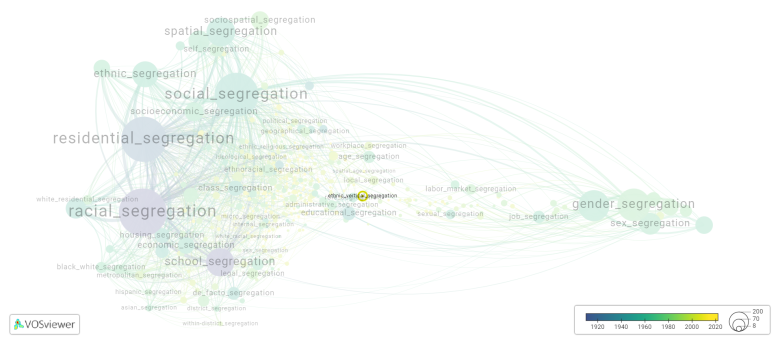Ethnic vertical segregation: Difference between revisions
(Creating page) |
(Creating page) |
||
| Line 18: | Line 18: | ||
[[File:ethnic_vertical_segregation.png|780x780px]] | [[File:ethnic_vertical_segregation.png|780x780px]] | ||
This visualization is based on the study [[ | This visualization is based on the study [[Segregation_Wiki:About| The Multidisciplinary Landscape of Segregation Research]]. | ||
For the complete network of interrelated segregation forms, please refer to: | For the complete network of interrelated segregation forms, please refer to: | ||
Latest revision as of 07:17, 16 October 2024
Date and country of first publication[1][edit | edit source]
2016
Greece
Definition[edit | edit source]
Ethnic vertical segregation refers to the physical separation of different ethnic or racial groups within a multi-story building or a high-rise structure. It specifically refers to the tendency for different ethnic groups to occupy different floors or levels of a building, resulting in spatially segregated communities.
This phenomenon is often seen in urban areas where various ethnic or racial groups may cluster in specific neighborhoods or areas due to historical or socioeconomic factors. In some cases, economic disparities or discrimination may lead to certain groups being concentrated in lower levels or basement apartments, while others occupy higher levels or penthouses.
Ethnic vertical segregation can have social and economic implications. It may contribute to the perpetuation of racial or ethnic disparities, as concentration in lower levels may limit access to resources, services, and opportunities available to those who reside in higher levels. It can also impact social cohesion, as physical separation may hinder interaction and integration among different ethnic groups.
Efforts to address ethnic vertical segregation often involve policies and initiatives aimed at promoting social integration, providing affordable housing options, and combating discrimination. These may include measures to encourage diverse housing development, improve access to education and employment opportunities, and foster inclusive communities.
See also[edit | edit source]
Related segregation forms[edit | edit source]
Ethnic vertical segregation is frequently discussed in the literature with the following segregation forms:
This visualization is based on the study The Multidisciplinary Landscape of Segregation Research.
For the complete network of interrelated segregation forms, please refer to:
References[edit | edit source]
Notes[edit | edit source]
- ↑ Date and country of first publication as informed by the Scopus database (December 2023).
At its current state, this definition has been generated by a Large Language Model (LLM) so far without review by an independent researcher or a member of the curating team of segregation experts that keep the Segregation Wiki online. While we strive for accuracy, we cannot guarantee its reliability, completeness and timeliness. Please use this content with caution and verify information as needed. Also, feel free to improve on the definition as you see fit, including the use of references and other informational resources. We value your input in enhancing the quality and accuracy of the definitions of segregation forms collectively offered in the Segregation Wiki ©.
Ethnic vertical segregation appears in the following literature[edit | edit source]
Maloutas T., Spyrellis S.N. (2016). Vertical segregation: Mapping the vertical social stratiication of residents in Athenian apartment buildings. Mediterranee, 2016(127), 27-36. Presses Universitaires de Provence.https://doi.org/10.4000/mediterranee.8378

